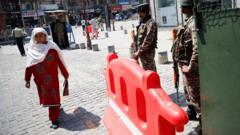As diplomatic tensions peak between India and Pakistan, the United States has urged both nations to collaborate in mitigating escalating violence and to ensure stability in South Asia.
**US Calls for Resolution in Kashmir Amid Rising Tensions Between India and Pakistan**

**US Calls for Resolution in Kashmir Amid Rising Tensions Between India and Pakistan**
The US emphasizes the need for peace and cooperation as violence escalates in Kashmir following a tragic attack that killed 26 civilians.
The US has called on India and Pakistan to take urgent steps toward de-escalation after a recent militant attack in Indian-administered Kashmir resulted in the deaths of 26 civilians. Secretary of State Marco Rubio reached out separately to India's foreign minister and Pakistan's prime minister in an effort to foster dialogue and maintain peace in the region.
The attack, which occurred on April 22 near the popular tourist destination of Pahalgam, has led India to accuse Pakistan of harboring the militants responsible. Islamabad has firmly rejected these allegations. In a retaliatory move, India has closed its airspace to all Pakistani aircraft, reflecting a series of escalating back-and-forth measures taken by both governments.
Indian Foreign Minister S Jaishankar emphasized the need for accountability for the "perpetrators, backers, and planners" of the attack, and during conversations with Rubio, he highlighted the importance of international support in combating terrorism. The US Secretary of State also expressed condolences and strongly condemned the attack in discussions with Pakistani Prime Minister Shehbaz Sharif, urging Pakistan to cooperate in the investigation.
Sharif, however, dismissed India's accusations, urging the US to advocate for a reduction in hostility from India’s side. Reports have emerged that the Pakistani information ministry holds credible intelligence indicating that India may be preparing for military action against Pakistan, a speculation not publicly acknowledged by Indian authorities.
In response to the recent incidents, Indian Prime Minister Narendra Modi has reportedly granted the armed forces considerable autonomy in deciding how to respond, as tensions rise further. High-level security meetings have been convened, emphasizing a strategic response to the attack. Both nations have engaged in varying degrees of military exchanges, with intermittent small-arms fire reported.
The escalation of hostilities has also seen substantial diplomatic ramifications, with India enacting a visa suspension for Pakistani nationals and vice-versa, alongside blocking multiple Pakistani news channels and social media accounts for purportedly provocative content. These measures have led to an exodus of Pakistani nationals from India and a reciprocal return of Indian citizens from Pakistan.
The attack, which targets civilians in a historically contentious region, has ignited widespread anger in India, with Modi vowing punitive actions against those who orchestrated the violence. This incident reinforces Kashmir's long-standing status as a flashpoint between the two nuclear powers, which have clashed over the region since the partition of India in 1947. The world watches closely as both nations navigate these volatile waters, hoping for a resolution to longstanding grievances and an end to the cycle of hostilities.




















